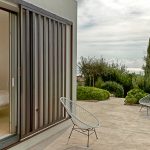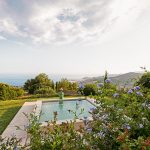At Fair Furniture, we deeply appreciate beautiful places, things, that are well made with attention to detail and that last a lifetime. We’d like to share about a special place that has come to our attention.
The Eremo is a magical, almost surreal, place. It’s a nest for two located on the top of a hill overlooking the seaside town of Imperia in the Liguria region of Italy.
It has a rich history: Once it was a hermitage, which was reached through the ancient Savoy road. It’s restoration has maintained the characteristics and the shapes of the ancient structure, respecting the pre-existing materials, as well as the traditional construction techniques. The walls were restored using only the original stones and the roof using slate.
The interiors are designed by Virgilia, the third generation of the family that owns the estate. We appreciate that the decor has been carefully selected, from lamps to cutlery. A particular attention has been paid to the use of natural dyes and fabrics, not harmful to the environment or to the guests: the floor with a smooth finish, for example, was made with a method that uses lime and wax , without any resins.
We are incredibly happy that our Acapulco chairs, handwoven and ethically produced in Mexico from phthalate-free PVC, have become part of this magical place.
The Eremo is surrounded by a private garden, just for the guests, organized on three wide layered areas. Designed by French landscape designer Jean Muss, it combines the delicacy of flowers, exclusively white and blue, and citrus fruit with the strength of the Mediterranean scrub. Many of the plants already belonged to this place: centenary lentisks and myrtles, so large that you can sit inside them and relax in the shade.
If you’re thinking of a quiet Italian getaway, in an unforgettable place, this might be the place for you. For more information on Eremo, please visit their website https://www.molinodeigiusi.it/en/, or send them an email info@molinodeigiusi.it.
All photographs courtesy of Settimio Benedusi.






